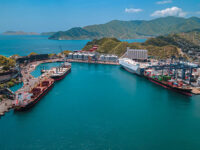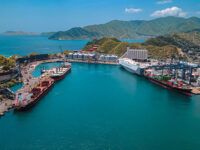The Guayaquil Port Authority

The Guayaquil Port Authority (APG) arose from a massive assistance scheme to rebuild urban, road, aviation and maritime infrastructure destroyed during World War II. The International Bank for Reconstruction and Development (IBRD), created in the 1950s, was approached by the Executive Roadway Committee to fund the construction of the so-called Puerto Nuevo (New Port). On March 24, 1958, Architect Sixto Durán Ballén, Minister of Public Works, asked the President of the Republic, Dr. Camilo Ponce Enríquez, to issue an emergency executive order for the creation of the Guayaquil Port Authority. Emergency Executive Order No. 15, of April 10, 1958, was published two days later in the Official Register 486. Article 4 lists the attributions of the Guayaquil Port Authority to achieve its goals, including the services to be provided, the regulation and coordination of commercial shipping operations, cargo movement and storage, and all administrative and control procedures.

Fast forward, ever since our current President Guillermo Lasso took office in 2021, the Administration has worked hard to boost the country’s economy and help the population thrive.
The port-city of Guayaquil is one of the most powerful economic arteries and a symbol of Ecuador’s national economy. A modern port and sound foreign trade make it one of the major ports in Latin America. Known as the “Pearl of the Pacific,” a significant share of the country’s foreign trade enters or exits through Guayaquil, crucial for the Ecuadorian economy. It not only moves cargo, but is also a vital transshipment center for other countries in the region.

The Guayaquil Port Authority is the government entity responsible for providing port services through public terminals operated by private enterprises, under the figure of concessions or delegations, and ensures that the latter execute the agreed investments, provide efficient services, and implement projects and strategies in benefit of the country’s foreign trade, all within the applicable legal framework.
The port administration works continuously to promote and support collaborative efforts toward new and better paths for the vital development of Ecuador. Its tenants are not only investing to reinforce their operations but also to strengthen their commitment to the country, its foreign trade and its citizens.
The Port of Guayaquil, number one in Ecuador and among the most important on the Eastern Pacific Ocean, moves more than 85% of the non-oil cargo. The Guayaquil Port Authority, through public terminals under concession or delegation, moved more than 12 million MT of cargo and over 1 million TEUs in 2022, clearly demonstrating the growth of the port city.
The APG revenue in early 2021 was $25 million and reached $28 million by late 2022. New projects included the installation of a VTS system to automate the Guayaquil channel, which will help organize and control vessel traffic in the area. This will have a positive impact, ensuring safe navigation along the channel, triggering a monetary reduction in vessel insurance and, in turn, lowering costs for end consumers.
The concession agreement with Contecon was also updated to add the Special Economic Development Zone (SEZ) known as Libertador Simón Bolívar, which aims to attract major port and logistics development and investments, creating more jobs in the industry.

The port expects to exceed $40 million per year by 2025, through projects such as outsourcing pilotage supporting services, awarding a concession for the grain terminal, and automating the main channel in Guayaquil. Achieving this revenue goal would attract greater investment and progress to the city and the entire country.
Ecuador has a thriving future, and Guayaquil must be prepared with the necessary port infrastructure and work hard to move forward in benefit of Ecuadorian trade.




